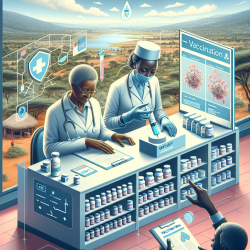Enhancing Skills with Data-Driven eTraining
In the realm of healthcare, particularly in speech-language pathology and related fields, data-driven decisions are paramount. The recent research article, "Enhancing care: evaluating the impact of True North Sexual Health and Rehabilitation eTraining for healthcare providers working with prostate cancer patients and partners," provides a compelling case for the implementation of specialized eTraining programs. This blog explores how practitioners can leverage the findings of this study to enhance their skills and improve patient outcomes.
The Importance of Specialized Training
Prostate cancer treatments often lead to sexual health complications, which are frequently under-addressed in the healthcare system. Patients express a significant need for support and counseling, highlighting a gap in care that healthcare providers must bridge. The True North Sexual Health and Rehabilitation eTraining program was designed to fill this gap by increasing healthcare providers' knowledge and self-efficacy in providing sexual healthcare to prostate cancer patients and their partners.
Data-Driven Outcomes
The study evaluated the impact of a 12-week virtual training program, revealing significant improvements in participants' perceived knowledge and self-efficacy. Key outcomes included:
- Enhanced knowledge and confidence in conducting assessments and providing interventions for sexual dysfunction.
- High satisfaction rates among participants, with 98.2% expressing satisfaction with the educational intervention.
- Sustained self-efficacy three months post-training, indicating long-term benefits of the program.
Clinical Implications
The data underscores the importance of real-world educational interventions in increasing healthcare providers' competence. By focusing on self-efficacy, the program equips providers with the confidence to address sexual health issues, ultimately leading to better patient-provider interactions and comprehensive care.
Encouraging Further Research
While the study presents promising results, it also highlights the need for further research. The absence of a control group and reliance on self-reported data are limitations that future studies should address. Practitioners are encouraged to delve deeper into this field, exploring innovative educational methods and their impact on patient care.
Conclusion
The True North Sexual Health and Rehabilitation eTraining program exemplifies how data-driven education can empower healthcare providers. By enhancing knowledge and self-efficacy, such programs improve the quality of care for prostate cancer patients and their partners. Practitioners are encouraged to consider similar training opportunities to enhance their skills and contribute to better patient outcomes.
To read the original research paper, please follow this link: Enhancing care: evaluating the impact of True North Sexual Health and Rehabilitation eTraining for healthcare providers working with prostate cancer patients and partners.










